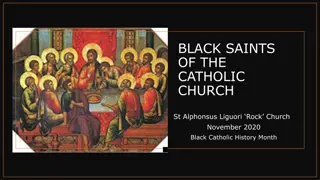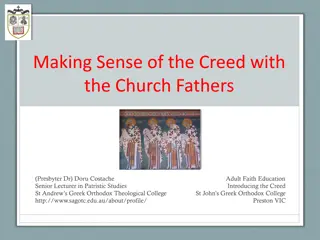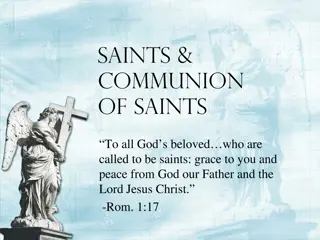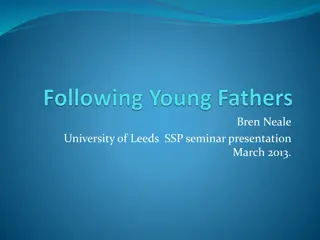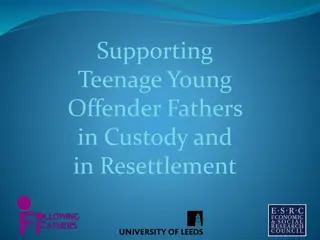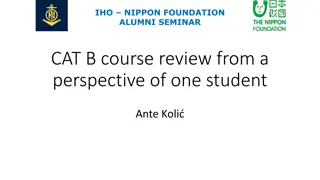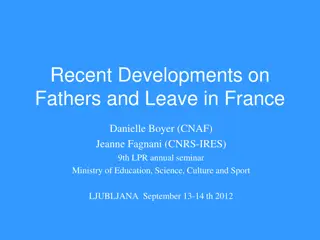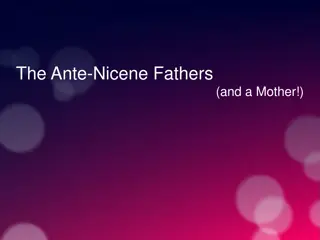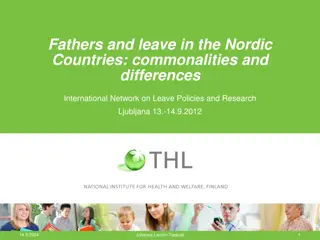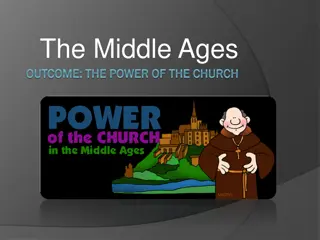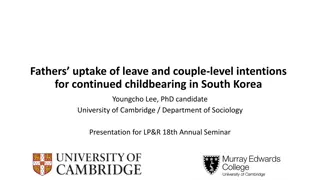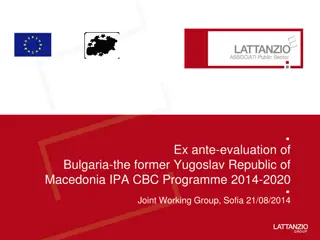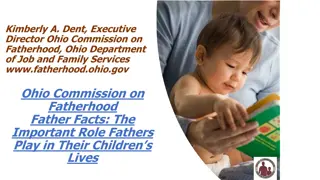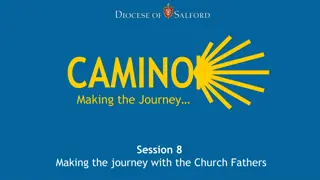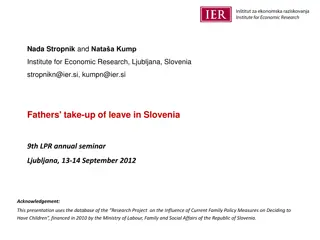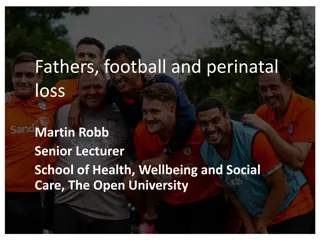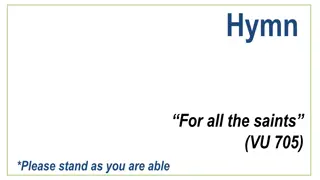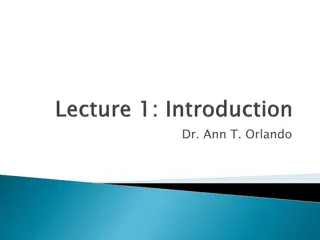Exploring Ante-Nicene Church Fathers and Saints
Delve into the rich history and stories of Ante-Nicene Church Fathers and saints like St. Olympias and St. Cyril of Alexandria. Learn about their unwavering faith, challenges they faced, and their significant contributions to Christianity during a period of division and growth in the 5th century.
Download Presentation

Please find below an Image/Link to download the presentation.
The content on the website is provided AS IS for your information and personal use only. It may not be sold, licensed, or shared on other websites without obtaining consent from the author. Download presentation by click this link. If you encounter any issues during the download, it is possible that the publisher has removed the file from their server.
E N D
Presentation Transcript
Opening Prayer Hail Mary, Mother of God, venerable treasure of the whole world. You are the lamp that is never extinguished, the crown of virginity, the rule of orthodoxy, the incorruptible temple containing the one whom nothing can contain, the Mother and Virgin, through whom the one who comes in the Name of the Lord receives in the Gospel the name of "Blessed." Through you, the whole universe, possessed by idolatry, has attained the knowledge of the truth. Through you, holy Baptism comes to those who believe. Through you, the oil of gladness reaches us. We salute you, who have borne the immensity of God in your virginal womb. Through you, churches are established in the whole world. Through you, peoples are led to conversion. Through you, the Trinity is sanctified. Through you, even more, the only-begotten Son of God has radiated like light upon those who sat in darkness and the shadow of death. Through you, the Cross is venerated in the whole world. Through you, heaven is filled with joy. Through you, the Angels and Archangels rejoice. Through you, the Prophets have announced their message, and the Apostles have proclaimed salvation to the nations. Through you, demons are sent flying. Through you, the dead rise, and kings exercise their royalty, by the power of the Holy Trinity. Through you, the tempter devil is cast out of heaven. Through you, the fallen creature is elevated to heaven. Amen.
Week Seven St. Olympias St. Leo the Great St. Peter Chrysologus St. Vincent of Lerins St. Cyril of Alexandria
5th. c. Roman empire began to crumble Division began to be more visible in the East/West churches New heresies springing up, reactions to new challenges inspire great works and councils Council of Ephesus Council of Chalcedon A rise in preaching about Christmas
St. Olympias Wealthy young widow, refused to remarry Spent her life and fortune on good works Good friend of St. John Chrysostom -Accused of burning a church -Rejected the bishops replacing him Died in exile one year after St. John died
St. Cyril of Alexandria Born to a Christian family, his uncle was patriarch of Alexandria Cyril eventually followed. Followed the footsteps of St. Athanasius Opponent of a great heresy Church council convened to settle the dispute Which needed a second council to affirm Made an secular leaders angry
St. Cyril of Alexandria Battled Nestorius by preaching Theotokos Nestorian heresy Mary is only the mother of the human part of Jesus. Writings were deeply focused on Mary, but he also preached and wrote theological studies, commentaries on the Bible and letters.
Council of Ephesus Nestorius was the Patriarch of Constantinople - Asserted that Mary wasn t the Mother of God she was only the mother of the human Jesus St. Cyril argued a woman gives birth to a person, not a nature Christ is one person, with two natures human nature and a divine nature. Mary is Theotokos
Discussion Why do you think the doctrine of Incarnation was a hot topic in the early Church? Was the Incarnation of Jesus necessary? Discuss!
St. Vincent of Lerins Abandoned his military career entered a monastery on the Isle of Lerins (France) Only one surviving work Commonitory How can we tell the true from false doctrines? Vincentian Canon: believed everywhere, always, and by all
St. Leo the Great Pope from 440 to 461, faced many difficulties Negotiated w/ Attila the Hun to save Rome Endured the sacking (but not burning) of Rome by the Vandals Battled Nestorians and Monophysites Had to annul Ephesus II which he didn t attend and resulted in the death of St. Flavian Devoted himself to helping the Romans endure these trials.
St. Leo the Great Pope Sixtus III passed away, Leo was unanimously elected as the next pope in 440. One of the best administrative popes of the ancient Church. His letter to the emperor on the nature of Christ was debated at the Council of Chalcedon Preached and wrote about the Petrine supremacy
Council of Chalcedon Response to both the Nestorian and Monphysitism heresies Christ has two natures human and divine *They are distinct and united* Peter has spoken through Leo Anathema to him who teaches otherwise.
Discussion True devotion to Mary leads us to Christ. Discuss!
St. Peter Chrysologus Born in Imola, educated, Baptized and ordained deacon, later arc-deacon by Bishop Cornelius Grew up during the time when faith was declining faith was declining and heresies were persistent, especially Arianism Appointed Bishop of Ravenna by Pope Sixtus III after rejecting the popularly elected candidate by the people of Ravenna
St. Peter Chrysologus He was known as the Golden -worded by a name given by Empress Galla Placidia who was deeply impressed and touched by his zeal, brevity of words and clarity, organized homilies, rare skills in homily delivery. Galla later supported his projects as he served as Bishop Nature of his homilies were Scripture based, inspired holiness, love for the faith and Sacraments Encouraged the daily reception of the Eucharist Attacked the contemporary heresies in his homilies
St. Peter Chrysologus Emphasized the unity of prayer, fasting and mercy; cannot be separated, give life to each other He was highly trusted and respected for his gentle approach to issues Spoke vividly on the rightful place of the Pope in the world and in the church Outlined the reasons for Incarnation: Restore our true nature, we shall no longer be alienated by the fall of Adam and Eve Known for the saying: Holiness begets holiness and strengthen faith
Discussion What is an effective homily? Name at least three aspects. Discuss!
Questions? St. Benedict of Nursia St. Gregory the Great St. John Damascus Wrap up


